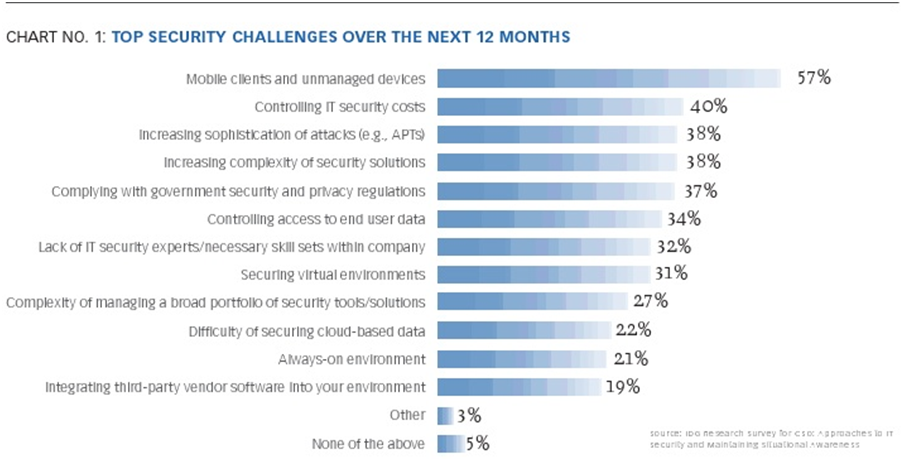Cybersecurity has become an increasingly urgent issue to address in the last decade. The Department of Homeland Security notes the sharp rise in cyber attacks and security breaches as a silent threat to national security. The private sector, too, has become more aware of the dangers of open cyberspace and companies are heavily investing in mobile device management teams and specialists to handle device and network security.
CSC, a business solutions firm that deals with both the private and public sector, recently published a whitepaper that highlighted companies’ concern with security and device management. According to a survey included in the paper, mobile clients and unmanaged devices ranked first as businesses’ top security challenges, followed by IT security costs and dealing with increased sophistication of attacks and breaches.
Despite a distinct decrease in lobbying investment recently, companies are spending more than ever on cybersecurity issues; only four firms listed lobbying dollars to cybersecurity in 2001, but in 2011 that number rose to almost 1,500. Most notable is that these firms are part of a diverse range of sectors – from defense to communications.
This increased focus on cybersecurity is a reflection of concerns relating to mobile device management and the resources it takes to maintain secure networks. As more companies deal with BYOD, or bring your own device, policies, the need for efficacious and cost-effective mobile device management has become increasingly important. The many factors involved in mobile device management policy, including user privacy, app management and security registration, make it logistically difficult and costly for companies to keep up with all moving parts.
Research in Motion, makers of the popular BlackBerry device, has been refocusing their product development on catering to businesses’ concerns about security and mobile device management. Jeff Kagan, a tech analyst with an expertise in telecommunications, says RIM boasts a more secure network than its competitors. Its continued focus on data security makes it attractive to businesses that are worried about the increase in data and sensitive information transfers via mobile devices.
RIM’s focus on network security could prove an advantage to its business, particularly at a time when cybersecurity is gaining attention both on the national and global stage. Governments, and even the United Nations, are paying more attention to the Internet and the regulations, ownership and data management associated with it. Businesses have certainly been aware of developments in the field for some time, but the new attention it has been receiving is unprecedented.
Next week, over 190 countries along with telecommunication and Internet businesses will be gathering in Dubai to grapple over the future of the Internet. The outcome of the conference could determine how national governments will proceed with cyber-policy making which, in turn, could affect the ways in which businesses will manage their data security, IT departments and, ultimately, the terms of mobile device management.
Phil Cohen is a graduate from San Diego State University, with a Bachelor’s in Computer Science and Public Relations. He is currently working with a computer firm in Houston, Texas. In his free time he enjoys freelance writing about technology products on his IdeaPad Notebook, as well as Scuba Diving, White Water Rafting, and taking Road Trips.

